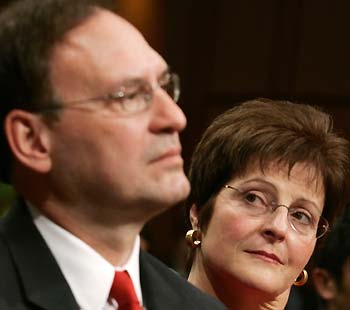|
US Supreme Court nominee Alito vows to administer equal justice
(Reuters)
Updated: 2006-01-10 09:33
U.S. Supreme Court nominee Samuel Alito, facing tough questions about
abortion, civil rights and the Bush administration's domestic spying program,
testified on Monday that if confirmed he would administer justice equally to all
Americans.
"There is nothing that is more important for our republic than the rule of
law," Alito told the opening day of a U.S. Senate confirmation hearing on his
nomination by President George W. Bush to the nation's highest court.
Republicans hailed Alito as a top-notch federal appeals judge for the past 15
years who earlier served as a prosecutor and Reagan administration attorney.

U.S. Supreme Court nominee Samuel Alito
listens to remarks at his Senate confirmation hearing on Capitol Hill in
Washington, January 9, 2006. [Reuters] | But
Democrats saw his nomination as highlighting their concerns about abuse of
prisoners in Iraq and the administration's recently disclosed domestic spying
program. Democrats also voiced concerns about what they see as Alito's support
of excessively broad presidential powers.
"In an era when the White House is abusing power, has authorized torture, and
is spying on American citizens, I find Judge Alito's support for an all-powerful
executive branch and almost unlimited power for government agents to be deeply
troubling," said Massachusetts Democrat Sen. Edward Kennedy.
Bush has nominated Alito, 55, to replace retiring Justice Sandra Day
O'Connor, a moderate conservative who has often been the swing vote on the
nine-member court on such issues as civil and abortion rights.
Confirmation of the more conservative Alito could push the high court to the
right for decades to come.
"No person in this country, no matter how high or powerful, is above the law,
and no person in this country is beneath the law," testified Alito following
opening statements by the committee's 10 Republicans and eight Democrats.

U.S. Supreme Court nominee Samuel Alito (L)
and his wife Martha attend his Senate confirmation hearing on Capitol Hill
in Washington January 9, 2006. [Reuters] | Alito, who personally opposed abortion while a Reagan administration lawyer
two decades ago, said: "A judge can't have any agenda, a judge can't have any
preferred outcome in any particular case and a judge certainly doesn't have a
client.
"The judge's only obligation, and it's a solemn obligation, is to the rule of
law," Alito testified under oath.
SHARPLY CONTRASTING VIEWS
Alito also said, "good judges are always open to the possibility of changing
their minds based on the next brief that they read, or the next argument that's
made by an attorney ... or a comment that is made by a colleague ...."
Republicans noted that while Alito has expressed opposition to abortion, he
has said he respects legal precedent, which includes the 1973 Supreme Court
ruling that legalized abortion.
Democrats, however, warned that Alito's record showed he has ruled
overwhelmingly against individual rights and in favor of government and large
corporations.
In a statement disputed by Republicans, Sen. Kennedy said, "Judge Alito has
not written one single opinion on the merits in favor of a person of color
alleging race discrimination on the job."
The hearing was adjourned for the day after Alito's opening statement. The
proceeding was to resume on Tuesday for at least two days of questioning of the
nominee.
While Alito is expected to be confirmed by the Republican-led Senate later
this month, his fate will be determined by his performance before the committee
where opponents hope a stumble or controversy can galvanize a move to block the
nomination.
Liberal advocacy groups concede it will be an uphill battle to stop Alito,
noting Bush's fellow Republicans hold 55 of the Senate's 100 seats. But they are
pressing Senate Democrats to make the case that Alito represents a threat to
basic rights.
Behind the scenes was the threat of a Democratic filibuster, which Democratic
Sen. Charles Schumer of New York said could become more likely if Alito ducked
questions about where he stands on abortion.
But Sen. Lindsey Graham, a South Carolina Republican and one of 14 bipartisan
lawmakers who would broker any such procedural effort to block the nomination,
predicted Alito would be confirmed, telling him: "I think you're going to be
just fine."
|